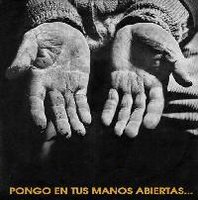Pinochet, Human Rights, and the Love of Justice


Over this past weekend, the former dictator of Chile, Augusto Pinochet, died from complications from a heart attack he suffered earlier this month. Ariel Dorfman, a fervent critique of Pinochet, writes that the struggle in Chile only now begins in earnest to deal with the legacy of this human rights violator. Marc Cooper agrees.
Pinochet hoped that his legacy would be that of a liberator, someone who freed Latin America from what he considered the pernicious ideology of communism. Instead, he came to represent the evil of Latin American national security fascism in the 1970s and 80s. Through Operation Condor, Pinochet was able to contribute to a campaign of surveillance and torture of left wing dissidents that extended throughout Latin America, exacerbating the "dirty wars" that left thousands of people dead.
One of the dead was the folk singer Victor Jara. Jara, who pioneered Nueva Cancion protest music in Chile, was arrested shortly after Pinochet's coup. He suffered torture for four days, including having his hands and wrists broken by the guards and then he was machine gunned to death. His experience was not at all unusual. As explained in 2004-2005 by the Valech Report, the official Chilean government report investigating the torture, prisoners suffered various forms of torture (some of which we have seen pop up again at Abu Graib and seem to have become part of the arsenal of modern torture techniques. Some of these are now allowable by U.S. forces under the Military Commissions Act of 2006) including:
*Repeated beatings
Deliberate corporal lesions
Bodily hangings [suspensions]
Forced positions
Application of electricity
Threats
Mock execution by firing squad
Humiliation
Stripping down to nakedness
Sexual aggression and violence
Witnessing and listening to torture committed on others
Russian roulette
Witnessing the execution of other detainees
Confinement in subhuman conditions
Deliberate privation of means of existence
Sleep deprivation or interruption
Asphyxia
Exposure to extreme temperatures*
*Sexual violence against women
This Commission heard testimony from 3,399 women, almost all of whom said they were the object of sexual violence; 316 said they were raped. Of the latter, 229 were detained while pregnant. Because of the torture they suffered, 20 of them aborted and 15 gave birth while in prison. Thirteen women said they were made pregnant by their captors; six of those pregnancies came to term.*
Instead of anti-communist hero, Pinochet comes to represent a new era in the creation of a global human rights regime, extending the work of Nuremberg onward to the International Criminal Court . As 1996 Nobel Peace Prize winner Jose Ramos Horta maintains, Pinochet's arrest in 1998 in the UK for crimes against humanity is one of the most important human rights developments in decades. His case signifies that heads of states are not immune from prosecution for committing such atrocities.
Hopefully, Pinochet's death can help renew a discussion in the United States about our nation's support for authoritarian powers in the name of "anti-terrorism", and can highlight what kinds of crimes governments frequently engage in, often against their own citizens, under the guise of freedom and security. In other words, perhaps we can use the occasion to engage fully in Jara's hope of a world where there is:
"Love of justice as the instrument that provides equilibrium for human dignity.
Love of peace in order to enjoy one's life.
Love of freedom, but not the freedom acquired at the expense of other's freedom, but rather the freedom of all."
Labels: human rights, latin america


4 Comments:
It's fitting somehow, that Pinochet died of a heart attack, the same way that Pablo Neruda died, a dozen days after Pinochet came to power. Pinochet's refusal to allow public mourning for Neruda, who was an ally of Allende, gave Chileans an excuse to attempt to subvert Pinochet's power through their own demonstrations of grief. His own death, however, does little to relieve the grieving of the families of disaparecidas and torture victims who owe their misfortune to his misrule.
Knowing that Chile is very divided between people who still believe that Pinochet was a solid and necessary leader for his time, and people who are dancing in the streets at the news of his death, I wonder how we in the US will look back on this time of torture and misdeeds in our name. Of course, we might say this is not a military dictatorship, this government was at least nominally elected, we have a "balance of powers" and so on. But I am haunted by just how unjust a mirror history is, and how dark the glass is while one lives in it.
"Hopefully, Pinochet's death can help renew a discussion in the United States about our nation's support for authoritarian powers in the name of "anti-terrorism", and can highlight what kinds of crimes governments frequently engage in, often against their own citizens, under the guise of freedom and security."
I'd like that. Instead I turned on my TV and watched as Pinochet was compared to Castro - and Pinochet came out the better, at least if you believed the talking heads.
That's not to say a better, more informed and more introspective discussion isn't happening, merely that it's not happening in the most public of places.
- Dennis
Dennis: Write a letter to the editor or a guest editorial. Its always important to seize the media. I'd like to think that the Engage blog can give people tools to begin their own informed forays into the media world either in the blogosphere or traditional print and audio works.
Post a Comment
Subscribe to Post Comments [Atom]
<< Home